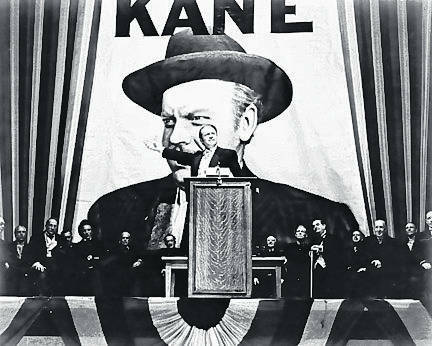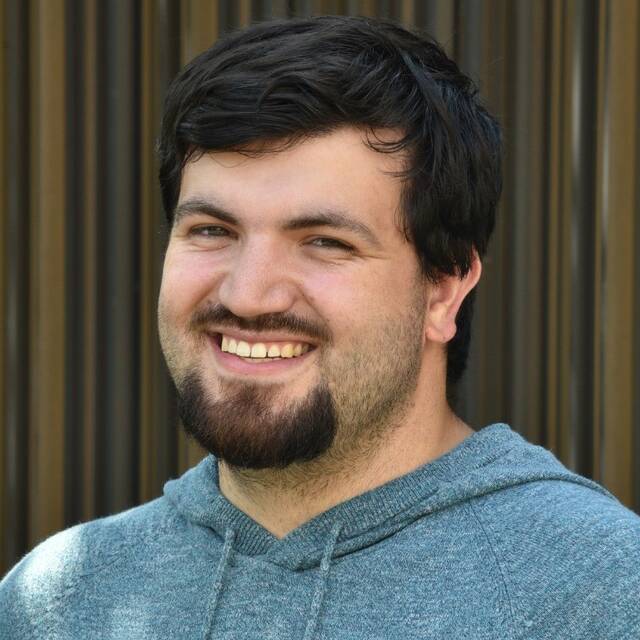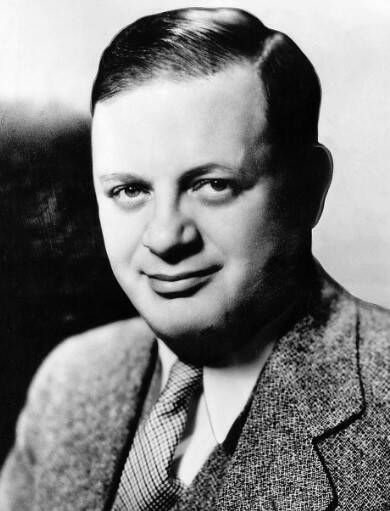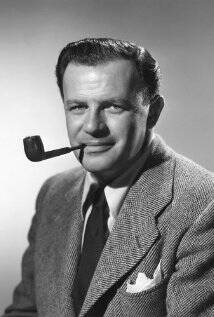
Orson Welles, standing, is shown in a scene from “Citizen Kane,” which was co-written by Welles and Wilkes-Barre native Herman J. Mankiewicz.
File Photo
For the past year or so, I’ve been enthralled by this passage from Nick Davis’ book “Competing with Idiots: Herman and Joe Mankiewicz, a Dual Portrait”:
“In the late 1980s, the town of Wilkes-Barre approached Joe with the idea of holding a film festival to celebrate the two brothers,” Davis wrote, referring to the titular, filmmaking, and famous Mankiewiczs. “Joe shut it down immediately. The idea of sharing a bill with Herman was intolerable.”
Davis snuck this detail into the final chapter of the book, a biography of sorts of his grandfather, Herman J. Mankiewicz, and his great-uncle, Joseph L. Mankiewicz.
Because the Mankiewicz brothers spent some formative years in the Wyoming Valley, it makes sense that they would have been acknowledged by the City of Wilkes-Barre, especially while Joe was still alive. There’d be plenty of material. A Mankiewicz film festival could include “The Wizard of Oz,” “The Philadelphia Story,” “Citizen Kane,” “The Ghost and Mrs. Muir,” “All About Eve,” “Guys and Dolls,” “Cleopatra,” and “Sleuth.” It’d be stacked.
From the Wilkes-Barre side, I wanted to know what exactly happened to the film festival that Davis said Joe Mankiewicz shut down.
Now, I’ve already made a mystery out of an oversight in an In Frame column. In the first edition, I said that “Day of the Painter” was a difficult short film to find in the wild, only to realize after the fact that it was on YouTube the entire time (special recognition is owed to the Ball State University library for pointing this out).
However, this Mankiewicz film festival business was more perplexing. I had taken Davis’ account at face value, but a column from a local legend in the journalist space — not myself — added a dash of uncertainty to the mix.
An idea is sparked
On June 11, 1989, Joe Butkiewicz — the aforementioned local legend — wrote a column for the Times Leader with the following news:
“… recognition for [Joseph L.] Mankiewicz and other filmmakers from the Wyoming Valley will be forthcoming when some of their films will be presented by the Wyoming Historical and Geological Society. The event will be held on Friday, Sept. 22 at the Kirby Center in Wilkes-Barre and will feature a reception.”
Perfect. What must have happened is that, without 80-year-old Joe Mankiewicz’s involvement, the Wyoming Historical and Geological Society (now the Luzerne County Historical Society) went ahead and organized this film festival anyway.
That makes sense. Joe Mankiewicz, though in the midst of a pseudo-retirement by 1989, would have been a huge get for the city at that point. He would have been an honored guest, but not an essential one in order to go forward with the film festival plan.
The problem is that neither Joe Butkiewicz nor any other local publication ever wrote about this event again. The Kirby Center has no record of it happening. The Luzerne County Historical Society seems to have no record of it, either.
Was it just canceled? If the issue here was that they didn’t want to go forward with the event without Joe Mankiewicz in attendance, why does no one from that time have any recollection of the supposed snub? Were there two different film festivals planned in the late 1980s, both of which fell apart for different reasons? What was to be served at the reception? Many questions are arising.
Mankiewicz family history
Let’s take a breather to talk about the challenging relationship between Joe Mankiewicz and his older brother, Herman.
Joe followed his sibling to Hollywood in the 1920s and never looked back. Both brothers have Oscar nominations and victories to their names, though Joe often felt he was overshadowed by Herman. If you look at each of their credits, Joe’s career was certainly more successful than Herman’s, but brothers will be brothers, I’m told.
Let’s also return to their relative Nick Davis, who I had the honor of meeting in Manhattan at the end of last year. When virtually accepting the Luzerne County Arts & Entertainment Hall of Fame awards for both Herman and Joe, Davis said the following, an elaboration on the previously noted book passage:
“Joe, late in life, got a call from the Chamber of Commerce of Wilkes-Barre, where he was born, and where Herman and he had both spent some very important formative years. The Wilkes-Barre Chamber of Commerce said that they wanted to honor Joe, and they were going to do a film festival. At first he thought, ‘This’ll be great! I like nothing better than being feted.’ And then they said, ‘Yeah, we’re going to do a Mankiewicz brothers film festival.’ And Joe said, ‘I want no part of that.’ This was 30 or 35 years after Herman had died. That’s how large Herman loomed as an older brother, eleven and a half years older, in Joe’s mind.”
For the purposes of my/our film festival search, the introduction of the Wilkes-Barre Chamber of Commerce into the fold as potential organizers is interesting, to say the least. This lends some credibility to the idea that two separate events were being planned: one that was shut down by Joe Mankiewicz, and one to be held in 1989 that fizzled out or was altered for a different reason.
The film festival that never was
Following the path of Joe Butkiewicz’s summer of ‘89 column, I came into contact with the most enlightening resource of all. John Cardoni served as an assistant technical director, assistant director, and operations director/technical director at the F.M. Kirby Center for the Performing Arts, and was on the team there when the film festival idea plan was hatched. He is currently the general manager at the Scranton Cultural Center at the Masonic Temple.
Cardoni told me that he could recall some discussion of the film festival happening in 1989, but that it ultimately ran into funding issues. He said that this was a common issue in the Kirby Center’s early years. Under its current name, the Kirby Center opened on Sept. 19, 1986, almost exactly three years prior to when the film festival was supposed to happen.
Another bit of information from Cardoni that caught my attention was his commentary on the organizers of such an event. He said that the Wilkes-Barre Chamber of Commerce, the Wyoming Historical and Geological Society, and even the Kirby Center board all likely had members in common in 1989. That might explain why Butkiewicz and Davis were citing different organizations in their accounts.
With all of this in mind, what the hell actually happened to the Mankiewicz film festival that never was?
Here’s my best guess:
• Some members of the Wilkes-Barre community, each of whom were on various organizational boards in the area, formed a plan to host a film festival at the Kirby Center centered around local filmmakers, headlined by the Mankiewicz brothers.
• This group of organizers was confident enough in their plan to tell the media about the event, down to the date and host venue.
• The group realized that the funding for a film festival might be a challenge to collect, and, without the appearance and blessing of Joe Mankiewicz behind it, the film festival idea fizzled with little fanfare.
• A goofball — 36 years later — spends a year of his life trying to understand why this wonderful idea never came to be, and he loses sleep over it.






